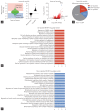Association between DIO2 Thr92Ala polymorphism and hypertension in patients with hypothyroidism: Korean Genome and Epidemiology Study
- PMID: 36646987
- PMCID: PMC9993109
- DOI: 10.3904/kjim.2022.292
Association between DIO2 Thr92Ala polymorphism and hypertension in patients with hypothyroidism: Korean Genome and Epidemiology Study
Abstract
Background/aims: Recent evidence has identified the significance of type 2 iodothyronine deiodinase (DIO2) in various diseases. However, the role of DIO2 polymorphism in metabolic parameters in patients with hypothyroidism is not fully understood.
Methods: We assessed the polymorphism of the DIO2 gene and various clinical parameters in 118 patients who were diagnosed with hypothyroidism from the Ansan-Anseong cohort of the Korean Genome and Epidemiology Study. Furthermore, we systematically analyzed Genotype-Tissue Expression (GTEx) data.
Results: A total of 118 participants with hypothyroidism were recruited; 32 (27.1%) were homozygous for the Thr allele, 86 (73.9%) were homozygous for the Ala allele or heterozygous. Patients with hypothyroidism with DIO2 polymorphism without hypertension at baseline had higher incidence of hypertension compared to patients without DIO2 polymorphism. Analysis of the GTEx database revealed that elevation of DIO2 expression is associated with enhancement of genes involved in blood vessel regulation and angiogenesis.
Conclusion: Commonly inherited variation in the DIO2 gene is associated with high blood pressure and prevalence of hypertension in patients with hypothyroidism. Our results suggest that genetic variation in the hypothalamic-pituitary-thyroid pathway in influencing susceptibility to hypertension.
Keywords: Blood pressure; Hypertension; Hypothyroidism; Iodothyronine deiodinase type II.
Conflict of interest statement
No potential conflict of interest relevant to this article was reported.
Figures



Similar articles
-
Type 2 deiodinase Thr92Ala polymorphism is associated with a reduction in bone mineral density: A community-based korean genome and epidemiology study.Clin Endocrinol (Oxf). 2020 Sep;93(3):238-247. doi: 10.1111/cen.14206. Epub 2020 May 11. Clin Endocrinol (Oxf). 2020. PMID: 32324283
-
Pathophysiological relevance of deiodinase polymorphism.Curr Opin Endocrinol Diabetes Obes. 2018 Oct;25(5):341-346. doi: 10.1097/MED.0000000000000428. Curr Opin Endocrinol Diabetes Obes. 2018. PMID: 30063552 Free PMC article. Review.
-
Heterozygote Advantage of the Type II Deiodinase Thr92Ala Polymorphism on Intrahospital Mortality of COVID-19.J Clin Endocrinol Metab. 2022 May 17;107(6):e2488-e2501. doi: 10.1210/clinem/dgac075. J Clin Endocrinol Metab. 2022. PMID: 35137147 Free PMC article.
-
Type 2 Deiodinase Thr92Ala Polymorphism and Aging Are Associated with a Decreased Pituitary Sensitivity to Thyroid Hormone.Thyroid. 2023 Mar;33(3):294-300. doi: 10.1089/thy.2022.0472. Epub 2023 Feb 13. Thyroid. 2023. PMID: 36680751
-
The Type 2 Deiodinase Thr92Ala Polymorphism Is Associated with Higher Body Mass Index and Fasting Glucose Levels: A Systematic Review and Meta-Analysis.Biomed Res Int. 2021 Oct 7;2021:9914009. doi: 10.1155/2021/9914009. eCollection 2021. Biomed Res Int. 2021. PMID: 34660805 Free PMC article.
Cited by
-
A Retrospective Analysis of the Changes in Prediabetes-Associated Markers of Thyroid Function in Patients from Durban, South Africa.Int J Mol Sci. 2025 Feb 28;26(5):2170. doi: 10.3390/ijms26052170. Int J Mol Sci. 2025. PMID: 40076791 Free PMC article.
References
-
- Bhargava HN, Das S, Bansinath M. Proliferation of thyrotropin releasing hormone receptors in specific brain regions during the development of hypertension in spontaneously hypertensive rats. Peptides. 1987;8:231–235. - PubMed
-
- Bruhn TO, Jackson IM. Abnormalities of the thyroid hormone negative feedback regulation of TSH secretion in spontaneously hypertensive rats. Regul Pept. 1992;38:221–230. - PubMed
-
- García SI, Alvarez AL, Porto PI, Garfunkel VM, Finkielman S, Pirola CJ. Antisense inhibition of thyrotropin-releasing hormone reduces arterial blood pressure in spontaneously hypertensive rats. Hypertension. 2001;37(2 Pt 2):365–370. - PubMed
-
- García SI, Porto PI, Alvarez AL, et al. Central overexpression of the TRH precursor gene induces hypertension in rats: antisense reversal. Hypertension. 1997;30(3 Pt 2):759–766. - PubMed
-
- Zwaveling J, Pfaffendorf M, van Zwieten PA. The direct effects of thyroid hormones on rat mesenteric resistance arteries. Fundam Clin Pharmacol. 1997;11:41–46. - PubMed
Publication types
MeSH terms
Substances
LinkOut - more resources
Full Text Sources
Medical
